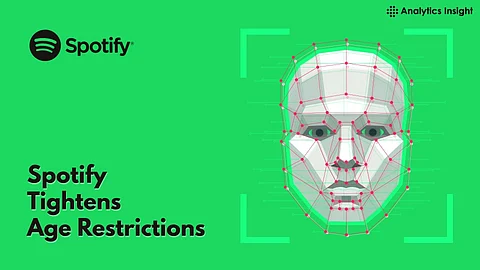

For consumers attempting to stream content marked as 18+, the Spotify face scan is a new hurdle: prove your age or press stop. Streaming your favorite tunes now includes a pause of a different sort. Facial recognition is no longer something that happens in the future; it’s included in how you listen.
The new music censorship system is being implemented throughout the UK, where the app has started imposing age checks on users who try to access explicit music videos or adult content. Users must either upload an official document showing their ID or use a facial age estimate tool, powered by UK technology firm Yoti, to verify they are 18 or older.
This broad overhaul is Spotify’s reaction to the UK Online Safety Act, which took effect on July 25. The legislation aimed at safeguarding children from toxic online content now is compelling technology platforms to redesign how age is authenticated online.
The action comes as the app attempts to meet new UK rules that call for tighter control over young people’s access to adult-rated content. Media regulator Ofcom enforces the Online Safety Act, which mandates platforms to implement strong, privacy-friendly age verification measures for harmful content to children.
Music videos labeled as ‘18+’ by content owners are included here. And the penalty for non-compliance is hefty: up to £18 million or 10% of a firm’s worldwide revenue. Other sites, such as Reddit, Discord, and even smaller community-based apps, are similarly under pressure to authenticate their users.
The music streaming platform offers two choices: complete a face scan via Yoti’s AI-powered tool or upload a government-issued document. If a user skips both, access to age-restricted content is blocked. Regular music streaming remains unaffected unless the user is found to be underage.
For accounts with the listed age under 13, Spotify will disable access and start a 90-day countdown. The account will be permanently removed if satisfactory age documentation is not provided within the timeframe.
Spotify argues that the system ensures that only adults can access content intended for adults, but the compromise has drawn trenchant criticism from digital rights groups.
Whereas Spotify and Yoti insist that no facial information or biometric identifiers are retained following the checking process, privacy campaigners are not so sure. Critics believe this creates a worrying precedent in which engagement with culture and content is restricted through biometric compliance.
Issues about algorithmic bias in facial age estimation also arise, including accuracy in varying genders, ethnicities, and age groups. There are concerns about how consent, error correction, and data protection would be managed in the long term.
Digital rights groups caution against ‘mission creep,’ whereby tools for child protection introduced for surveillance are eventually expanded to broader user behavior.
Also Read: Streaming Scandal: Spotify Accused of Enabling Illicit Drug Promotion
The app’s rollout is a watershed as the world online adapts to a new era of regulation for safety first. Platforms previously solely concerned with user experience now have to navigate landmines of law, and consumers are caught in the middle.
For Spotify users, it’s a matter of privacy versus playback. The music can continue playing, but the access terms are no longer visible. The question is: how much of your face and freedom will you scan away?
